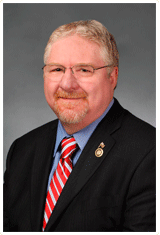Most of the Missouri Senate’s work this week focused around tax credits. On Thursday, we approved Senate Bill 20, which was combined with legislation I sponsored. The measure renews and extends the sunset of a handful of the state’s benevolent tax credit programs, including the Public Safety Officer Surviving Spouse Tax Credit, the Champion for Children Tax Credit (formerly known as the Children in Crisis Tax Credit), the Residential Dwelling Accessibility Tax Credit, the Pregnancy Resource Center Tax Credit and the Food Pantry Tax Credit.
These programs are critical in helping charitable and non-profit organizations provide aid to Missouri families in need. I was grateful to see it pass. The bill now goes to the House for consideration.
We also approved Senate Bill 10 this week, a measure that will create a tax credit to help communities attract more amateur sporting events to the state. These events generate a lot of economic activity in the areas where they’re held. Visitors spend money at local hotels, shops and restaurants, which not only helps those businesses, but also raises revenue for our state.
More importantly, the tax credit is figured using the amount of tickets sold, meaning every community in the state, not just the metro areas, can benefit from the incentive. The credit is also capped at $3 million a year, and assuming every visitor spends around a $100—about the cost of a hotel room these days—the state will break even.
We also began debating broad tax credit reform in the Senate this week. As I’ve written about in the past, Missouri’s tax credit programs have grown exponentially in recent years. The state spent more than $600 million on tax credits last year alone. The out-sized growth of these programs is beginning to seriously hamper our ability to invest in education and state infrastructure.
A handful of measures were filed this session to reform our tax credit programs. Most of these bills propose placing some sort of cap on the credits. In years past, this was a serious point of contention between members of the Senate and the House. This year looks to be different. There’s broad support for finally addressing tax credit reform, and leadership has indicated it will be one of our top priorities. I only hope all sides remain open to compromise so we can finally fix what is clearly a flawed system.
A number of 20th District citizens have been nominated for appointment to various state boards and commissions. I was honored this week to sponsor the appointment of Michael Jinks to the Missouri Propane Gas Commission; Dr. Brian Vesely to the Missouri Board of Examiners for Hearing Instrument Specialists; and Melinda Nicholson to the Missouri State Foster Care and Adoption Board.
On Thursday, I filed Senate Bill 248, which addresses an issue that’s currently affecting citizens in our area. Neighborhood Improvement Districts (NID) are created in communities where residents wish to improve public facilities like sidewalks, parks or streetlights. The improvements are paid for by special tax assessments to property owners in the area of the project. But, these improvements can sometimes take a while to complete, and in that time, residents may sell their homes. When the new owner then purchases the home, they may not be aware a NID tax assessment has been placed against the house, or, in some instances, a lien has been filed against the property. This bill simply makes that information more easily accessible so prospective buyers know exactly what they’re getting into.
If you have any questions or comments about this or any other matter regarding your state government, please feel free to contact me at (573) 751-1503; you are also welcome to e-mail me at jay.wasson@senate.mo.gov. |



